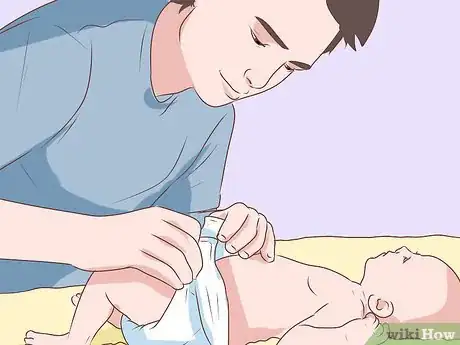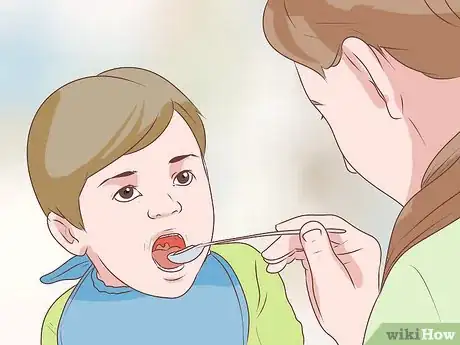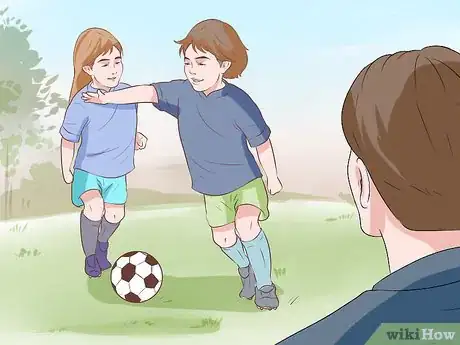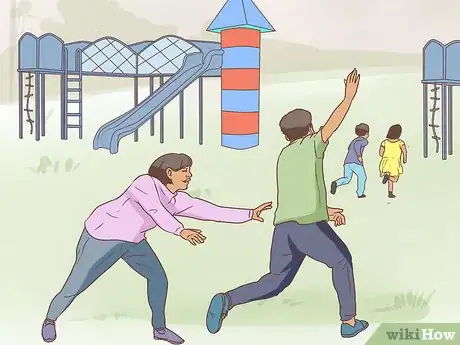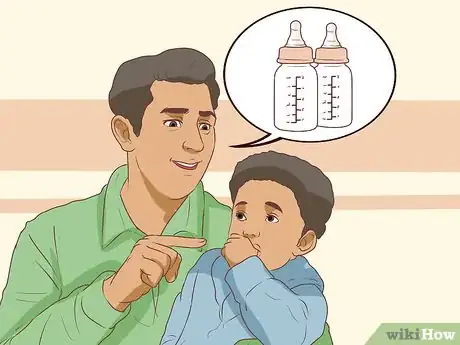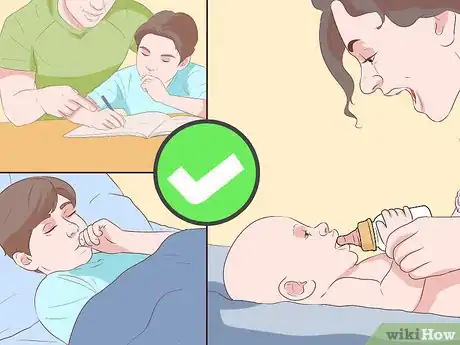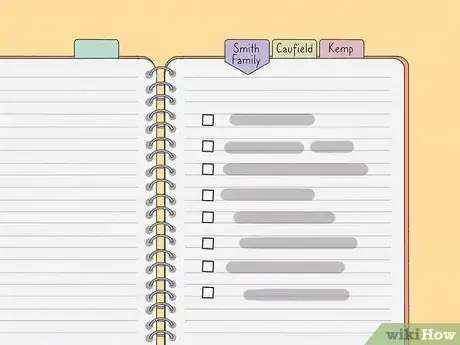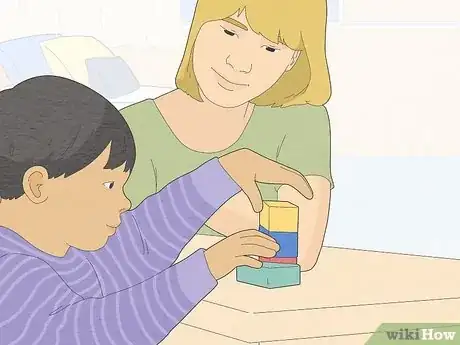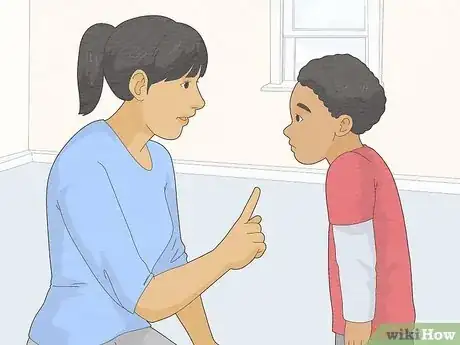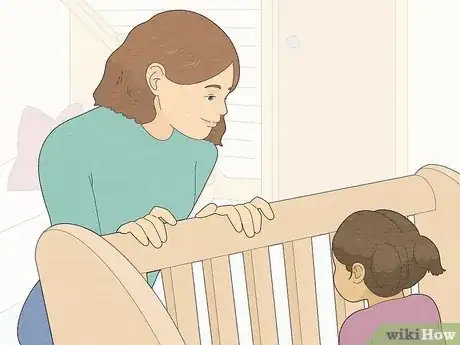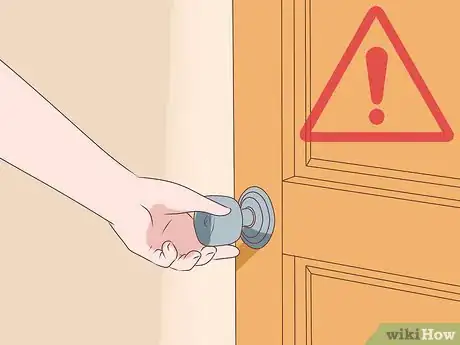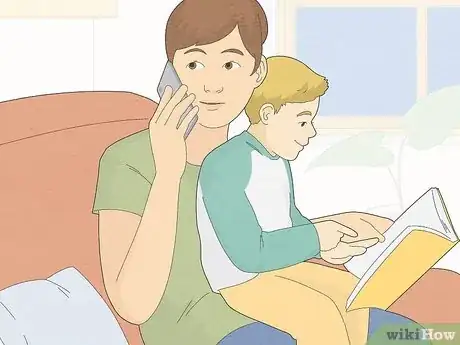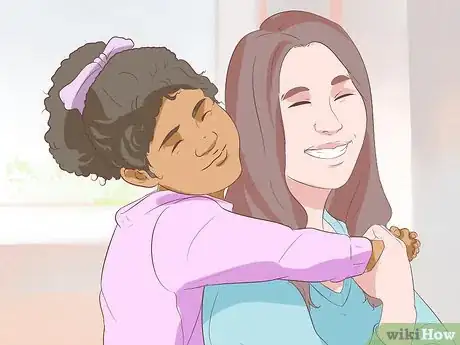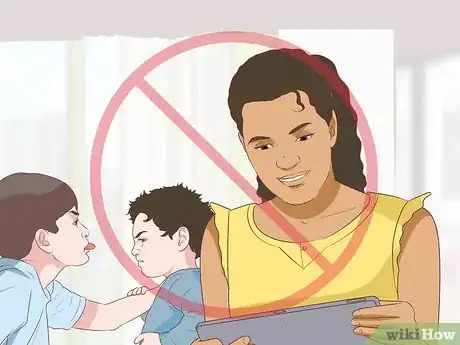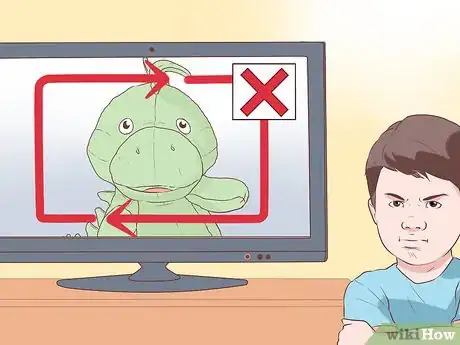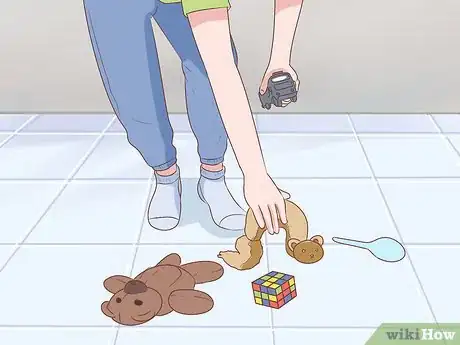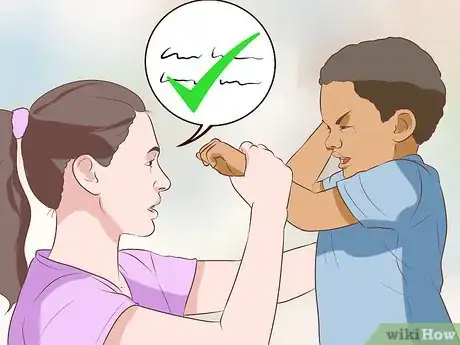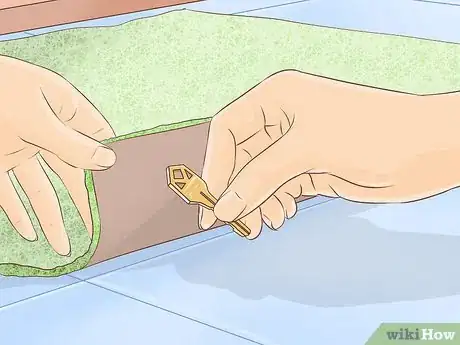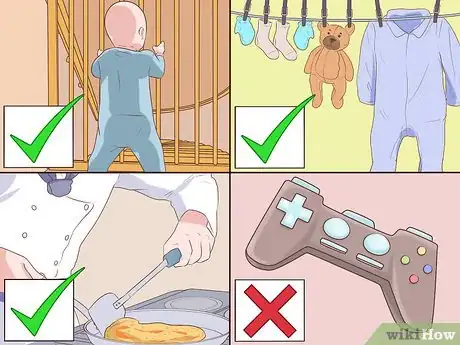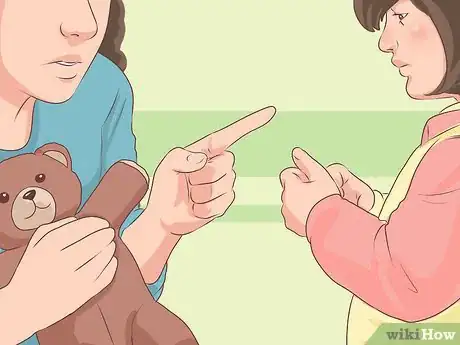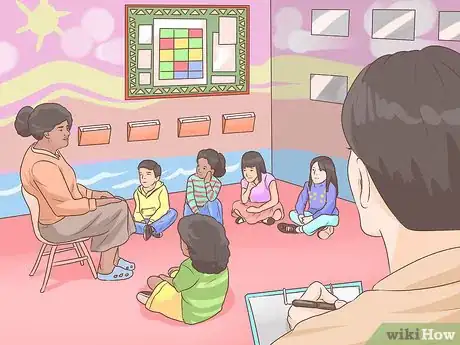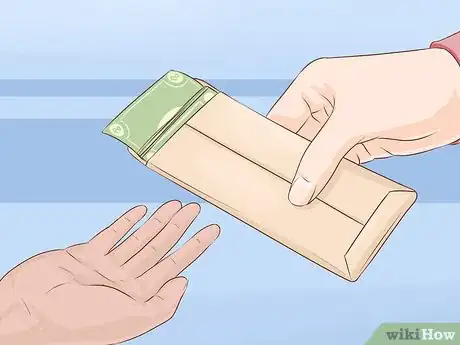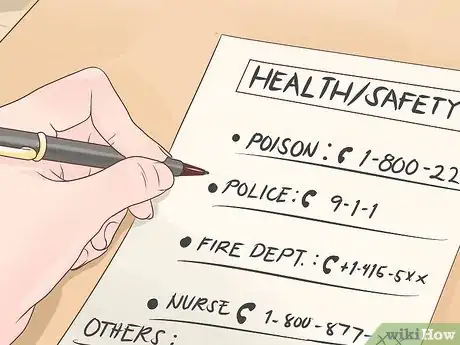This article was co-authored by Julie Wright, MFT and by wikiHow staff writer, Danielle Blinka, MA, MPA. Julie Wright is a Marriage and Family Therapist and the co-founder of The Happy Sleeper, which offers sleep consulting and online baby sleep classes. Julie is a licensed psychotherapist specializing in babies, children, and their parents, and the co-author of two best selling parenting books (The Happy Sleeper and Now Say This) published by Penguin Random House. She created the popular Wright Mommy, Daddy and Me program in Los Angeles, California, which provides support and learning for new parents. Julie's work has been mentioned in The New York Times, The Washington Post, and NPR. Julie received her training at the Cedars Sinai Early Childhood Center.
There are 12 references cited in this article, which can be found at the bottom of the page.
wikiHow marks an article as reader-approved once it receives enough positive feedback. This article received 19 testimonials and 100% of readers who voted found it helpful, earning it our reader-approved status.
This article has been viewed 583,325 times.
Babysitting requires a lot of patience and maturity, but it can also be really fun! If you’re new to babysitting, you might be wondering how to find clients, what to charge, and how to be a good babysitter. Don’t worry—with a bit of preparation and dedication, babysitting can be an enjoyable, rewarding job (that also earns you some extra cash!).
Steps
Being a Successful Babysitter
-
1Spend time getting to know the kids. Babysitting is as much a job as it is an opportunity to enjoy the company of children. The kids will be more receptive to you and your rules if they like you, and they’ll grow to like you faster if you try to develop a relationship with them. Talk with them, ask them questions, and joke around in order to develop a good relationship. Younger kids might not want to talk for too long, so try to incorporate during play or activities.
-
2Learn how to change a diaper. If the children you are watching are under 3 years old, chances are they’re still in diapers. If you’ve never changed a child’s diaper before, ask the parents to show you how they do it.Advertisement
-
3Know how to feed children. You should know how to bottle-feed, spoon feed, and keep children safe in the kitchen.
- Feed the children healthy food. It is not good babysitting to just allow the children to eat whatever. Tell them before they get crackers they have to eat a piece of fruit. These things include apples, carrots, grapes, and oranges.
- Be sure the child doesn't have something they are not allowed to have (such as a cookie or ice cream) too often.
-
4Find out the bedtime routine. Give a warning before sending kids to bed. You may want to let them stay up 10-15 minutes past what their parents allow—just be sure they know it's a special treat. Other than that, be firm with when it's time to go to sleep. Be prepared for some whining. For older kids, you need to know the difference between real problems and stall tactics. For babies, you have to be sure the sleep environment is safe.
- End-of-day routines help kids wind down and signal their bodies that it's time for sleep. Ask parents what they usually do before bedtime. Maybe they have rules like no TV or computer time for an hour before bedtime. If they typically read, talk quietly, or listen to music before bed, follow the same routine.[1]
- Go through the basics. Take a child to the bathroom (or put on a nighttime diaper). Help the child brush their teeth. Find out from parents what else is necessary before the kid hops under the covers.[2]
- Always put babies (and children) to bed in their designated sleep space (be it a bed, crib, bassinet, etc.) This is especially important for babies, who can be injured if their sleep space isn't how it should be. Remove padding, pillows, stuffed animals, and other items from the crib, if these items are present. Be sure to lay babies on their back when putting them to sleep. It helps reduce the risk of suffocation.
- Give the child any comfort items, such as pacifiers, stuffed animals, or blankets, that they usually sleep with. Do not give stuffed animals and similar to babies.[3]
- If a child calls you/wakes up, wait a minute before going in. They may fall back asleep on their own. If a baby can't go back to sleep, stroke them gently on the arms or belly. If the baby uses a pacifier, that can also help. Find out what calming tactics the parents use.
-
5Join in with their play time activities. Although your job is to watch over the children, you should be interacting with them as much as possible by playing with them. Play will vary based on their ages; if you’re watching an infant you may be doing nothing more than making faces and holding up toys. Get creative with the things you come up with for the children to do to keep them interested and out of trouble. Make-believe games are great fun. You could even make up a simple handshake with the children.
- Be an entertainer. Parents love babysitters who help kids have fun and learn while still reinforcing rules and keeping discipline. Ask kids to show you their favorite toys. Find out from parents and other babysitters what games kids of different ages like to play. Get the kids outdoors if you can.
- Playing with toys, board games, and activity-based games are all good options for older children. Ask what their favorite thing to do is. You can also bring a few of your favorite games and toys from when you were their age, like Monopoly, Life, Candyland, Uno, or other card games.
- Stay off screens. Parents are paying you to watch the kid, not put them in front of a television all day.
-
6Tell stories. Kids like stories, and they'll be impressed by even the worst storytellers. Come equipped with obscure fairy tales they probably haven't heard, like "The Shoemaker and the Elves" or "The Twelve Dancing Princesses." You can even use stories as rewards.
-
7Come up with fun projects. If you’re spending a long time watching the children, you can do projects together that are enjoyable for everyone. Consider doing an arts and crafts project or cooking/baking a new recipe (or an old favorite) together. Boxed mixes of brownies, cookies, and cakes taste delicious.[4]
- Making something will feel productive, pass the time, and give the kids something to be proud of.
-
8Take them to a playground if the parents say it's okay. Simple games like tag and hide and seek get kids active and help them stay fit. Dancing with them is great exercise, too!
- If you can’t leave the property, play outside in the yard, if possible.
-
9Check in often. Kids aren't as good at regulating their time as adults are, and often forget to perform basic bodily necessities. Check once every hour or so to see if they need to go to the bathroom, need water to drink, are tired, or are hungry. Most of the time they won’t think to tell you these things on their own, so always be sure to ask.
-
10Follow the schedule. Assuming the parents gave you a basic outline of daily activities, you should be sure you are keeping up with it. Make sure you are feeding the kid(s) at proper meal times, giving them naps, having them do their homework on schedule, etc.[5]
-
11Watch a movie if allowed. If there is time watch a movie with the kids, you can do so towards the end to settle the children down before their parents arrive. If you are babysitting for less than 3 hours, this probably isn't a good idea, as the parents may get mad at you for putting their kid(s) in front of television for half the time. Consider movies such as:
- Tarzan
- Finding Nemo
- Tangled
- Wreck-It Ralph
Babysitting Tips
-
1Ask the parents questions before you take the job. You don’t have to accept every babysitting job you’re offered. It’s really important that you feel comfortable and up for the responsibility. Talk to the parents before you babysit to make sure you’re ready.[6] Ask questions like:
- How many kids will I be babysitting?
- How old are the kids?
- What time will you be leaving and coming home?
- What do you expect from a babysitter? Will I need to feed the kids? Put them to bed?
- Do the kids need help with brushing their teeth or using the restroom?
- Are the children allergic to anything?
- What should I do if there’s a fire?
-
2Get a list of emergency numbers. It’s very unlikely that anything bad will happen, but it’s always best to be prepared. On your phone number list, write down the home’s address and home telephone number if there is one. That way, you can easily provide them in the case of an emergency. Make sure you have the following phone numbers:[7]
- The children’s parents
- Neighbors
- Their doctor
- Poison control
- Fire and rescue
- Police
-
3Keep a checklist for each family your babysit for. A checklist will make your job so much easier. On your checklist, write the children’s schedule, the house rules, and the foods the kids can eat. Include information about meal times, nap times, and bedtimes. Additionally, note if the parents allow you to have friends over, and any friends they’ve approved.[8]
- Bring the checklist every time you babysit so you can easily fulfill your duties. That way, you can focus more on having a great time with the kids.
-
4Assemble a “babysitting bag” with supplies and toys. Preparing your bag in advance saves you time on the day of your babysitting job. Additionally, it’ll help you be the babysitter all the kids ask for because you have special toys and games. In your bag, you might include:[9]
- Your babysitting checklist.
- Tips for babysitting.
- Age-appropriate games.
- Age-appropriate toys.
- Art supplies.
- Books.
- Puzzles.
-
5Wear comfortable clothing. Babysitting can be quite the adventure, especially if the kids are imaginative. You might find yourself chasing pirates or having a dance off. Pick an outfit that you can easily run around in.[10]
- Your shoes are probably the most important part of your outfit. Wear shoes you can run in without tripping or losing a shoe.
-
6Get to the home before the parents leave. Your job technically starts a few minutes before the parents are scheduled to leave. Before they head out, double check with them that you have all the proper instructions. Additionally, ask for a tour of the home if it’s your first time there. You’ll look super professional and your job will be off to an easy start.[11]
-
7Contact the parents if you need help. Sometimes things go wrong when you’re babysitting, so don’t be afraid to reach out. For small issues, send a quick text to ask for help. If you need help right away, call them and tell them what’s wrong.[12]
- You could text them things like, “I can’t find the extra toilet paper,” “How many snacks did you say they could have?” or “Where can I find Kiley’s favorite stuffie?”
- On the other hand, call the parents if something more serious happens, such as a child getting sick or a child who won't stop crying.
-
8Play with the kids. Both you and the kids will have a better experience if you play. The sky’s the limit when it comes to activities. You can keep it simple and play with toys, games, or puzzles. Or, get creative and make a craft, put on a play, or pretend to be pirates. Just have fun![13]
- Always ask the kids what they want to do. You’ll have a much easier time if you play with their favorite toys or play games that they like.
-
9Be kind to the kids, even if they misbehave. One of the hardest parts of babysitting is dealing with a child who’s acting out. Fortunately, this won’t happen very often. Dealing with these kinds of problems can be really stressful, but try to stay calm because it’s super easy to hurt a child’s feelings. If you do have a kid misbehave, stay calm and gently remind them what they’re supposed to do.[14]
- You might say, “Your mom said we can’t throw balls in the house, remember? Let’s play a different game.”
- You could also say, “It’s not okay to hit. Why don’t you say you’re sorry so we can go play some more?”
- If the behavior continues, you may have to contact their parent.
-
10Keep your eyes on the kids at all times. As the babysitter, it’s up to you to keep the children safe. Children are really curious and very clever, so they can quickly get themselves into trouble when left unattended. Focus on them for the entire time they’re in your care.[15]
- If you put the children to bed, continue to check on them every 15 minutes.[16] Make sure they’re still in bed and sleeping peacefully.
-
11Don’t open the door for strangers. Keep the front door shut and locked for the entire time you’re babysitting. Only open the door for someone you’re expecting. If someone you don’t know comes over, tell them they can come back later.[17]
- Don’t tell strangers you’re the babysitter. Just say that it isn’t a good time. You could say, “Right now’s not a good time for us. You can come back tomorrow if this is important.”
-
12Be flexible. Sometimes the parents will need you to arrive a bit earlier than planned, or they may be running late on their way home. Be open to staying a little late or coming early when they need you. On the plus side, they'll see you're a dependable, reliable babysitter, so they may hire you more.[18]
- Sometimes you just can't stay late, such as when you have a curfew. Tell the parents before they leave so they're home on time.
Avoiding Mistakes
-
1Do not leave the children in your care alone. No matter what the circumstances are, your job as a babysitter is to watch the children in their home and you shouldn’t leave them. Make sure you never leave the children alone in the house. Being in a different room is fine unless you're caring for a baby but running up to the store for ingredients or taking a walk without them is out of the question.
- This applies even for older children, unless the parents gave you explicit directions stating that they could be home alone for a small period of time.
-
2Don’t bring people over to the house. Unless the children you are caring for have friends who were pre-planned on coming over, no one should enter the home at any point during your stay. You should not have people—friends or family—coming over to spend time hanging out while you should be working unless you've agreed this in advance with the parent/s.
- It can be tempting to invite a friend over late at night while the kids are asleep, but even this is off limits unless the parents have approved.
-
3Don’t abuse electronics use. With cell phones, tablets, and laptops more prevalent now than ever, it can be easy to get caught up texting friends or scrolling through Facebook. Just like many jobs, your electronics should be turned off or used only in case of emergency. You are being paid to babysit, not to talk to friends.
-
4Don’t play movies/TV on repeat. Children will often ask to just watch movies or TV, and while these may be appropriate in short allotments, several hours of them becomes laziness. If the parents haven’t set an electronics maximum, try to keep it at two hours or less. The children will enjoy having someone to play with, and the parents won’t think that you’re lazy or slacking on the job.[19]
-
5Clean up before the parents get home. Although it is sometimes forgotten, a major part of babysitting is cleaning up after the children. You may not have much of a mess to deal with, but if you cooked or did a project, be sure to put everything back in its place. The parents will appreciate coming home to a clean house and will be more likely to rehire you again in the future.
- Always clean up after yourself. If you and the children make a mess, pick up before the parents arrive.
- Play cleaning games with the kid. Say whoever picks up the most wins or makeup a silly game that includes cleaning.
- Usually there is a mess when you get there, pick it up. Everyone appreciates it when they come home to a house cleaner then when they left it.
-
6Don't let the children "get away" with things. It's tempting to be the "cool" babysitter who lets kids get away with things parents never allow. Remember, you're not their parents, so you don't really have much say in how the house rules go. You can't be a child's friend all the time.
- Know when to say no and when it's OK to let something small go like letting children stay up 5 minutes past bedtime on occasion.
- Children will challenge you. Pushing boundaries to see how much they can get away with is a normal way kids (even toddlers) learn and figure out where they stand. Check in with parents to find out what the rules are, then follow them, even if you don't agree with them!
- The best babysitters think of the job as a responsibility first, with having fun, or earning money, second. Few things are as rewarding as knowing you've earned a child's trust and affection.
- Always feel free to call the parents if you feel you need to. It is better to be safe than sorry, and most likely the parents will appreciate your concern.
-
7Make sure that you know procedures for emergencies. Before the parents leave, find out who to call, what to do, and where to go in case of an emergency. Your priority is keeping the children safe.[20]
- Get all relevant information regarding emergencies before the parents/guardians leave. This could be emergency numbers, where the main "Home" phone is kept, where a spare door key is, etc. Try not to come off as nosy, and the adult(s) will realize that you are just attempting to help. In this way you can be sure of what to do in an emergency and get the children out.[21]
- In the event of an emergency, such as a fire, drop everything and get the child or children and yourself out of the house. Do not reenter the house, do not let go of the children and call emergency services as soon as possible.
Preparing for the Job
-
1Get the parents’ and child's information. When you arrive on site for the job, start by getting all the information about the parents’ whereabouts for when they leave. Write down their full names and phone numbers, the address(es) of their destination(s), and their estimated time of arrival back at the house, and an emergency contact. Also take down any information on the child, such as allergies (or other health information). This list will need to be longer and more detailed for longer time periods. [22]
- Have the parents show you the location of first aid supplies and medications.
- Get a list of medications that each child may need to take, or is able to take in case of injury or illness (such as Tylenol for growing pains or a headache).
- Write down the child/children’s schedule. Most families have a general (or sometimes more specific) timetable of events in a child’s day. This typically includes meal times, the times for certain chores/homework periods, and bedtime. Getting this written down in advance will mean that the child (if they’re older) won’t be able to pull the wool over your eyes once their parents are gone.
-
2Find out what activities are allowed. Each household you work in will be slightly different, and it is important to find out what activities are allowed in each. Ask about television/video game/computer time, when/where the child may be allowed to play outside, if their friends are allowed over, and any areas of the house that may be off-limits. These rules may vary from child to child in the same household depending on age, so be sure to specify.
- Assume you are not allowed to take photos or video or the children. Ask if you are allowed to take and/or post pictures of videos of the children if you have a valid reason for doing this.
- Find out what you are allowed to do when the children are sleeping, if applicable. For instance, you may want to ask if you can use social media, watch TV, or, on rare occasions have friends over.
-
3Set up a menu for your time there. It is always good to have a plan. Depending on how long you’ll be babysitting, you may have to feed the child/children a meal or two. Ask the parents about what foods they prefer you prepare and serve, and what foods are appropriate for snack time.
- Clarify about any foods that aren’t allowed; these are typically candy and dessert-related goodies that the kids might ask for when their parents aren’t supervising.
- Kids, especially toddlers, may not want to play the activities you have planned. Be sure to come with backups and don't worry about staying too close to the activities part of the plan, as long as they don't use electronic devices too often.
-
4Find out what consequences are used when the child misbehaves. It is fairly likely that at some point in time, a child you are watching will misbehave. Rather than guessing and either punishing them too little or too much, ask the parents what they typically do for small misbehaviors. Many times this includes having privileges revoked or being put in time-out.[23]
- A parent could also say that you are not to punish them, and instead should report all misbehaviors to them.
Becoming a Babysitter
-
1Be a mother's helper. Being in a home while a parent is there will give you a chance to practice childcare skills and gain some valuable experience which will improve your chances of getting babysitting work. Helping out with your own younger siblings is excellent practice, too. If you don't have younger siblings try doing this with a little cousin or close friend's kids.
- Carefully observe the parents as they perform tasks you haven’t done before or are uncomfortable with. Ask for help learning skills you feel uneasy about, such as bathing a baby. Also, note your strengths, such as helping children with homework. These things can be included in your resume which will be explained in fuller detail later.
-
2Attend a childcare or babysitting class. In some areas, it is necessary to be licensed or certified before babysitting. Either way, it is helpful to know basic child-care responsibilities and techniques. Look for childcare, CPR, and first-aid classes in your area so that you are well-prepared and qualified for your first babysitting job. These can often be found at Red Cross,[24] YMCA, and other community centers.
- Try reading books about babysitting. These will answer many common questions about the care of infants and children in day-to-day and emergency situations.
-
3Set up a schedule. As a babysitter, you are likely working for yourself, unless you're a registered childminder, an au pair or a nanny. If you expect to be babysitting a lot, you'll have to make and maintain your own schedule. It may seem old-fashioned but filling out a calendar with all your free days and times, so that when a parent calls to schedule you for babysitting you'll know exactly when you are available is crucial.
- Creating a color-coding system may be helpful in organizing your ‘busy’ days on the calendar.
- Update your schedule frequently so that you don’t accidentally double-book yourself.
- Having a standard schedule with all of your other activities, sports, etc. can also be helpful for parents.
-
4Decide upon a rate of pay. Although some parents have a specific rate in mind when they hire a babysitter, many rely on the sitter to provide their hourly wage. There are two options for selecting a rate: being paid a flat rate per hour, or being paid per child. The former is better for small families while the latter is best if you plan on watching more than two children at once. You may want to charge more for weekends or for babysitting after midnight.
- Flat rate hourly wages typically range from $9-$15 per hour, but can be significantly more or less depending on the household and the area in which you or the family lives.[25]
- Per child wages range from $7-$10 per child, per hour. However, to get a better idea of the competition and to see what is suitable for the conditions, get an overview of what others in your area are charging for a family the size of the family you are sitting for.
-
5Create a list of health/safety information. You will also need personalized information for each child (such as allergy information), but you should have one generalized list of "worst-case-scenario" phone numbers. Keep all the information in a small notebook, a note-taking app, a binder, etc. so you have it with you at all times. You may want to include:
- Poison control
- Police station
- Fire department
- Nurse hotline
- A trusted person who has children (like an aunt or parent) to contact in case of a minor case of confusion
- Any other relevant numbers
- Forms for the parents to fill out.
-
6Market yourself. If you're new to babysitting, you'll need to let people know you're available. Word of mouth is often the easiest way to land a job. Talk to your neighbors, people from your church, or families at your school who have young kids. Ask friends who are babysitters if they know of any openings. If you have an older sibling who is moving on to another job, contact their clients.
- It's always best to babysit for someone you know or someone you've heard about from a friend. If you're new to babysitting, you may choose to only babysit for those you know.
- If word of mouth doesn't work, consider advertising in your neighborhood. You can use flyers delivered to homes in your area or send out an email if your neighborhood provides a list of residents. If you decide to advertise, check with your parents first. They need to know when you put out personal information. Put a flyer on any community notice boards.
- Put together a résumé outlining any specific skills, experience, and training you have.
- If you are old enough, register yourself on babysitting websites. Keep in mind that some of these won't accept you unless you are a certain age.
-
7Be prepared to be interviewed. It's hard enough to find parents who are looking for babysitters. The next step, and perhaps the hardest, is to make yourself seem worthy of the job. Set up interviews so you can get to know the parents and their children.
- Just as you'll be finding out if the job sounds good, the parents will be looking to learn as much as possible about you. Tell them about yourself, your family, your school, and why you want to babysit.
- Be prepared with a list of questions so you know what's expected of you. Write them down so you don't forget to ask anything. The answers you get to questions like these will help you decide if it's the right job for you.
- If you've interviewed the family and met the kids but still want to learn more, suggest another visit so you can spend more time with the kids. Most parents will be happy that you want to find out as much as you can.
-
8Know your comfort zone and its limits. Before you go, know what you're comfortable with and what you're not. You need to feel in control. If you're unsure about a job, it's better to wait for the next one. Your safety is as important as the safety of the kids you'll be watching. If this is a first babysitting job, make sure you feel comfortable about the family. Trust your instincts, and don't feel like you have to accept the job on the spot.
- Tell the family you need to talk it over with your parents before committing to the job. When you know what you want and what to expect, babysitting is a better experience for both you and the kids.
- If you don't feel like you have the skills to look after a newborn, don't take the job.
- If you're allergic to certain animals, you may need to turn down a job if the family has pets.
- Get to know the children beforehand to know if you are ready to babysit them. This also might help them see you as an authority, and prevent the tears when the parents leave.
-
9Ask yourself these questions before you decide to take the leap:
- Do you enjoy spending time with children?
- Are you prepared to take care of kids?
- Do you have an awareness of young children's needs?
- Have you taken a babysitting course?
- Do you have experience taking care of younger siblings or relatives?
- What can you offer to the kids and their families?
- Do you want to babysit occasionally or find a regular babysitting position?
- If income is a concern, will the hours and payment meet your needs?
- How many kids will you be taking care of?
- What are their ages? The amount of care needed differs with age.
- Do the kids have any special needs? Special diets?
- Does the family have pets? A pool?
- What are the hours you're expected to work?
- What are you allowed to do in the home (e.g., use their computer, help yourself to food and snacks or bring your own)?
- If you have your license, are you expected to drive the kids?
EXPERT TIPJulie Wright is a Marriage and Family Therapist and the co-founder of The Happy Sleeper, which offers sleep consulting and online baby sleep classes. Julie is a licensed psychotherapist specializing in babies, children, and their parents, and the co-author of two best selling parenting books (The Happy Sleeper and Now Say This) published by Penguin Random House. She created the popular Wright Mommy, Daddy and Me program in Los Angeles, California, which provides support and learning for new parents. Julie's work has been mentioned in The New York Times, The Washington Post, and NPR. Julie received her training at the Cedars Sinai Early Childhood Center.Childcare Specialist
 Julie Wright, MFT
Julie Wright, MFT
Childcare SpecialistOur Expert Agrees: The most important characteristics in a babysitter are a genuine love for and experience with children, along with integrity and a strong sense of responsibility. However, every parent will have their own unique needs, like requiring someone who drives, speaks another language, or has flexible hours.
Expert Q&A
Did you know you can get premium answers for this article?
Unlock premium answers by supporting wikiHow
-
QuestionIs it OK to start babysitting without taking any classes, and only having the experience of taking care of a younger sibling?
 Catherine Palomino, MSCatherine Palomino is a former Childcare Center Director in New York. She received her MS in Elementary Education from CUNY Brooklyn College in 2010.
Catherine Palomino, MSCatherine Palomino is a former Childcare Center Director in New York. She received her MS in Elementary Education from CUNY Brooklyn College in 2010.
Master's Degree, Elementary Education, CUNY Brooklyn College
-
QuestionWhat do I do if the parents order pizza and hand me the money, I think I would be scared to open the door when it rings.
 Catherine Palomino, MSCatherine Palomino is a former Childcare Center Director in New York. She received her MS in Elementary Education from CUNY Brooklyn College in 2010.
Catherine Palomino, MSCatherine Palomino is a former Childcare Center Director in New York. She received her MS in Elementary Education from CUNY Brooklyn College in 2010.
Master's Degree, Elementary Education, CUNY Brooklyn College
Warnings
- If you are babysitting an infant, only feed them food the size of their fist or smaller.⧼thumbs_response⧽
- Never spank or hit a child. Before the parents leave, ask them what kinds of consequences they want you to use if their child misbehaves and respect their wishes.⧼thumbs_response⧽
- Don't ever leave the kids with strangers, even if the kids seem to know them.⧼thumbs_response⧽
- Be sure to watch your language and actions. Children pick up on anything quickly and will claim to their parents you taught them how.⧼thumbs_response⧽
- Remember to never accept jobs you don't feel comfortable doing. Whether that's because of location, age, or the number of kids.⧼thumbs_response⧽
- The kids may get annoying, work through it.⧼thumbs_response⧽
- Avoid falling asleep while babysitting unless you are babysitting overnight (or the parents are coming home very late and have said it's okay). It's never a good idea to fall asleep on the job, especially since the kids you're babysitting could get into mischief and trouble.⧼thumbs_response⧽
- Kid-proof the areas you will be playing in. Make sure all electrical outlets are covered and put all sharp objects away. Make sure you do not let the kids get near cleaning fluids. Keep all types of medicines away, the child could think it is candy and gobble them up. Close all windows. If you're watching a toddler, keep all doors leading to basement stairs closed, and all bathroom doors closed.⧼thumbs_response⧽
References
- ↑ https://kidsit.com/get-kids-to-bed-babysitting
- ↑ https://kidsit.com/get-kids-to-bed-babysitting
- ↑ https://kidsit.com/get-kids-to-bed-babysitting
- ↑ http://www.urbansitter.com/blog/on-how-to-babysit-by-someone-who-knows/
- ↑ http://www.scholastic.com/annmartin/bsc/tips.htm
- ↑ https://www.healthychildren.org/English/safety-prevention/at-home/Pages/Babysitting-Reminders.aspx
- ↑ https://www.healthychildren.org/English/safety-prevention/at-home/Pages/Babysitting-Reminders.aspx
- ↑ https://www.healthychildren.org/English/safety-prevention/at-home/Pages/Babysitting-Reminders.aspx
- ↑ https://extension.usu.edu/utah4h/files/babysitting-member-manual.pdf
- ↑ https://www.minnesotasafetycouncil.org/facts/factsheet.cfm?qs=EF3A65C201912804BD43AD99EAAE5805%E2%80%8B
- ↑ https://www.minnesotasafetycouncil.org/facts/factsheet.cfm?qs=EF3A65C201912804BD43AD99EAAE5805%E2%80%8B
- ↑ https://www.healthychildren.org/English/safety-prevention/at-home/Pages/Babysitting-Reminders.aspx
- ↑ https://extension.usu.edu/utah4h/files/babysitting-member-manual.pdf
- ↑ https://extension.usu.edu/utah4h/files/babysitting-member-manual.pdf
- ↑ https://www.minnesotasafetycouncil.org/facts/factsheet.cfm?qs=EF3A65C201912804BD43AD99EAAE5805%E2%80%8B
- ↑ https://www.canr.msu.edu/news/safety_tips_for_beginning_babysitters
- ↑ https://www.canr.msu.edu/news/safety_tips_for_beginning_babysitters
- ↑ https://extension.usu.edu/utah4h/files/babysitting-member-manual.pdf
- ↑ http://www.med.umich.edu/yourchild/topics/babysit.htm
- ↑ https://www.iparentinglife.com/safety-tips-babysitter/
- ↑ https://www.iparentinglife.com/safety-tips-babysitter/
- ↑ https://www.canr.msu.edu/news/safety_tips_for_beginning_babysitters
- ↑ http://www.kidzworld.com/article/23599-babysitting-basics
- ↑ https://www.redcross.org/take-a-class/babysitting/babysitting-child-care-training/babysitting-certification
- ↑ https://www.today.com/parents/what-are-babysitter-rates-these-days-here-s-range-t148512
- ↑ https://www.minnesotasafetycouncil.org/facts/factsheet.cfm?qs=EF3A65C201912804BD43AD99EAAE5805%E2%80%8B
About This Article
When you babysit, join the children in their activities by being a student if they play school or playing board games with them. You can also come up with fun art projects to do together or make a batch of cookies with the children. While you’re babysitting, try to stick to the schedule set by the children’s parents, and make sure the children have their meals and go to bed when they’re supposed to. Finally, be sure to follow basic rules to keep the children safe, including never leaving them alone and not answering the door unless you know who’s there. To learn from our Childcare Center Director reviewer how to become a babysitter, keep reading!

